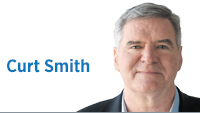Subscriber Benefit
As a subscriber you can listen to articles at work, in the car, or while you work out. Subscribe Now The Washington Post’s startling decision to not endorse a candidate in this year’s presidential race was surpassed only by its publisher’s candid confession on the sorry state of journalism.
The Washington Post’s startling decision to not endorse a candidate in this year’s presidential race was surpassed only by its publisher’s candid confession on the sorry state of journalism.
It came on the heels of a similar announcement by The Los Angeles Times.
Together, these two newspapers underscored the growing and disturbing divide between the reading public and legacy media.
Unfortunately, the way Jeff Bezos explained the Post’s decision only deepens that divide, while costing the newspaper 200,000 subscribers and key staff resignations.
Bezos, best known for founding Amazon and revolutionizing internet commerce, has owned the nation’s capital-city newspaper since 2013. Previously, and certainly under his tenure, the paper has been left of center in its news decisions and its editorial voice in and through the opinion page. It is the perfect confirmation of the famous “Lichter studies” that concluded journalism attracts, generally speaking, practitioners with a worldview left of center.
But in defending his abrupt decision, which Bezos concedes is startling due to “inadequate planning,” the publisher blames the symptom and not the true cause. The reason the public is losing trust in legacy media and many other institutions in society is the perception that they are not objective truth seekers or fair arbiters of public issues.
It is worth quoting Bezos’ own words to explain: “In the annual public surveys about trust and reputation, journalists and the media have regularly fallen near the very bottom, often just above Congress. But in this year’s Gallup poll, we have managed to fall below Congress. Our profession is now the least trusted of all. Something we are doing is clearly not working.
“Let me give an analogy. Voting machines must meet two requirements. They must count the vote accurately, and people must believe they count the vote accurately. The second requirement is distinct from and just as important as the first.
“Likewise with newspapers. We must be accurate, and we must be believed to be accurate. It’s a bitter pill to swallow, but we are failing on the second requirement. Most people believe the media is biased. Anyone who doesn’t see this is paying scant attention to reality, and those who fight reality lose. Reality is an undefeated champion. It would be easy to blame others for our long and continuing fall in credibility (and, therefore, decline in impact), but a victim mentality will not help. Complaining is not a strategy. We must work harder to control what we can control to increase our credibility.
“Presidential endorsements do nothing to tip the scales of an election. No undecided voters in Pennsylvania are going to say, ‘I’m going with Newspaper A’s endorsement.’ None. What presidential endorsements actually do is create a perception of bias. A perception of non-independence. Ending them is a principled decision, and it’s the right one,” Bezos wrote.
His decision is being viewed as a cowardly and craven capitulation to the politics of Washington, not as a blow for restoring journalistic integrity and excellence. It is hard to see it in any other light. It is troubling—especially for those of us who support local and national journalism and read three or four newspapers a day—to witness his mismanagement of the Post.
For him to help journalism, he would have needed to announce this decision well ahead of the current campaign season and combine it with other steps to demonstrate a commitment to “accuracy,” as he labels the journalistic enterprise.
The real journalistic enterprise is truth telling, not describing or cooperating with reality. But as one of the world’s richest men, Bezos appears not to be talking with many truth tellers.•
__________
Smith is chairman of the Indiana Family Institute and author of “Deicide: Why Eliminating The Deity is Destroying America.” Send comments to [email protected].
Click here for more Forefront columns.
Please enable JavaScript to view this content.
